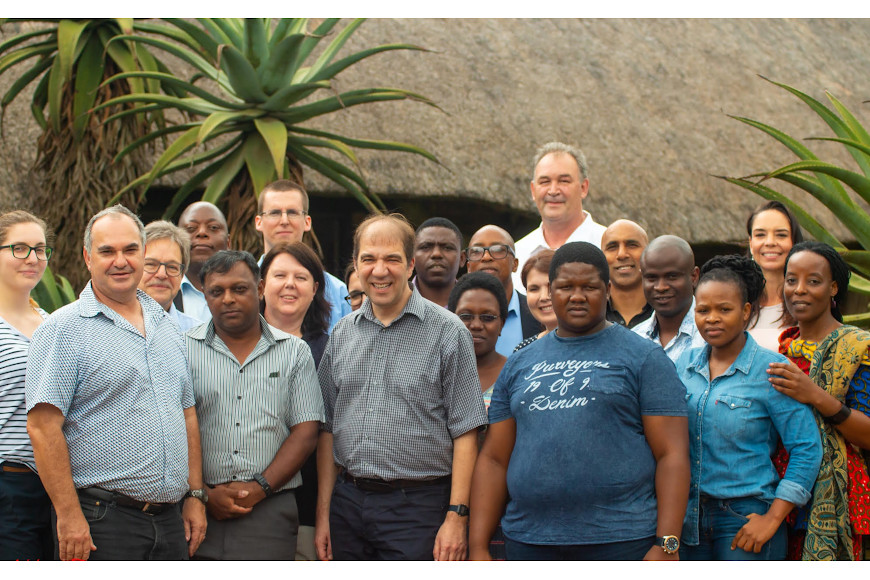The second South Africa -Germany bilateral research projects workshop, hosted by the Durban University of technology (DUT) and co-hosted by (CPUT), took place at the Tala Collection Game Reserve, Durban, last month.
The event was organised and hosted by Professor Tukayi Kudanga (Department of Biotechnology and Food Technology at DUT and co-hosted by Dr Marilize Le Roes-Hill (Biocatalysis and Technical Biology Research Group, Institute of Biomedical and Microbial Biotechnology, from CPUT.
The workshop takes place because in 2017, 12 South Africa-Germany bilateral research projects were launched, which are jointly funded by the Department of Science and Technology of South Africa, and the German Federal Ministry of Education and Research.
“The focus of the research projects ranged from topics such as wastewater, to the production of new compounds, but mainly aims to allow for the exchange, training and development of young researchers and PhD-level students. Three of the research projects, NOVBIOSURF, SLAC, and SYNDEX, recently came together for the second joint SA-Germany workshop, following the success of the first joint workshop held in Cape Town in 2018,” explained Prof Kudanga.
The workshop was opened on by DUT’s Executive Dean of the Faculty of Applied Sciences, Professor Suren Singh. He highlighted the importance of bilateral programmes and the formation of collaborations, especially as reflected in the successful and highly innovative research taking place within the Faculty of Applied Sciences at DUT.
His talk was followed by an institutional welcome given by Prof Sibusiso Moyo, the Deputy Vice-Chancellor (DVC): Research, Innovation and Engagement at DUT, who also gave a brief overview of research and entrepreneurial activities at DUT. The message conveyed by the Executive Dean and DVC was also echoed in the presentation given by Mr Teuns Phaphlamohlaka from the National Research Foundation of South Africa (NRF).
He strongly encouraged the researchers present to look towards accessing international funding for the continuation of research projects as well as further developing the collaborations established over the past few years.
DUT’s Prof Kugen Permaul kicked off the first scientific session as guest speaker with an introduction to the new multi-lateral research project he and his team will be involved with over the next few years: BRICS-BEST. The project will focus on the utilisation of lignocellulosic biomass in bioenergy production and generation of value-added products. This multi-lateral project will involve researchers from Brazil, Russia, India, China and South Africa. The guest speaker was followed by presentations in the SLAC project: Prof Jürgen Pleiss (Principal Investigator; University of Stuttgart), who highlighted the need for standardisation of biocatalytic data.
These talks set the scene for Prof Kudanga (Principal Investigator, DUT), who presented on the work performed in his research group around the application of laccases in biocatalysis reactions and modification of biomaterials. His talk was followed by two DUT student talks by Sandile Ngubane (The biochemical characterisation of Trametes pubescens CBS 696.94 laccase and its application in the production of novel antioxidants) and Faith Matiza Ruzengwe (Enzymatic modification of Bambara groundnut protein and amadumbe mucilage for the production of hydrogels).
The afternoon saw talks by the Director of the Technology Transfer Office, DUT, Prof Gerhard Prinsloo, highlighting the innovative research and commercialisation that have taken or are taking place at DUT.
Day two of the workshop started with an overview of the services provided by Inqaba Biotec and was followed by presentations on the SYNDEX project. The principal investigator, Dr Le Roes-Hill (Cape Peninsula University of Technology; CPUT), introduced the project and provided feedback on the progress to date. Dr Mariska Lilly (Proteomics Unit, CPUT) provided an overview of her research on mycotoxin-producing Fusarium clonal strains and the application of proteomic analyses in the identification of genes involved in the activation of mycotoxin production. Dr Mayowa Agunbiade (postdoctoral fellow, CPUT) presented on the work he has been doing with actinobacterial tyrosinases, while Prof Brett Pletschke (Rhodes University), a collaborator on the SYNDEX project, presented on the application of enzymes in the hydrolysis of pre-treated agricultural feedstocks.
On the final day of the workshop, Dr Bronwyn Kirby-McCullough (University of the Western Cape) introduced the workshop attendees to how actinobacteria associated with rooibos plants potentially promote plant growth, while the project NOVBIOSURF was introduced by Prof. Rudolf Haussmann (University of Hohenheim). He provided a detailed feedback on the current progress of NOVBIOSURF and the way forward. The workshop was closed by Prof Kudanga (DUT) and Dr Le Roes-Hill (CPUT) by highlighting key aspects touched on during the course of the workshop.
All in all, the workshop was a great success, allowing for the free exchange of ideas and the stimulation of in-depth discussions. The organisers also acknowledged the funding agencies from both South Africa (Department of Science and Technology; NRF) and Germany (Federal Ministry of Education and Research; DLR) for making the workshop possible. Also, potentially new collaborations were established and the workshop team are looking forward to the next joint workshop to be held in 2020.
Pictured: Participants of the second joint SA-Germany workshop held at the Tala Collection Private Game Reserve.
Story by: Professor Tukayi Kudanga


